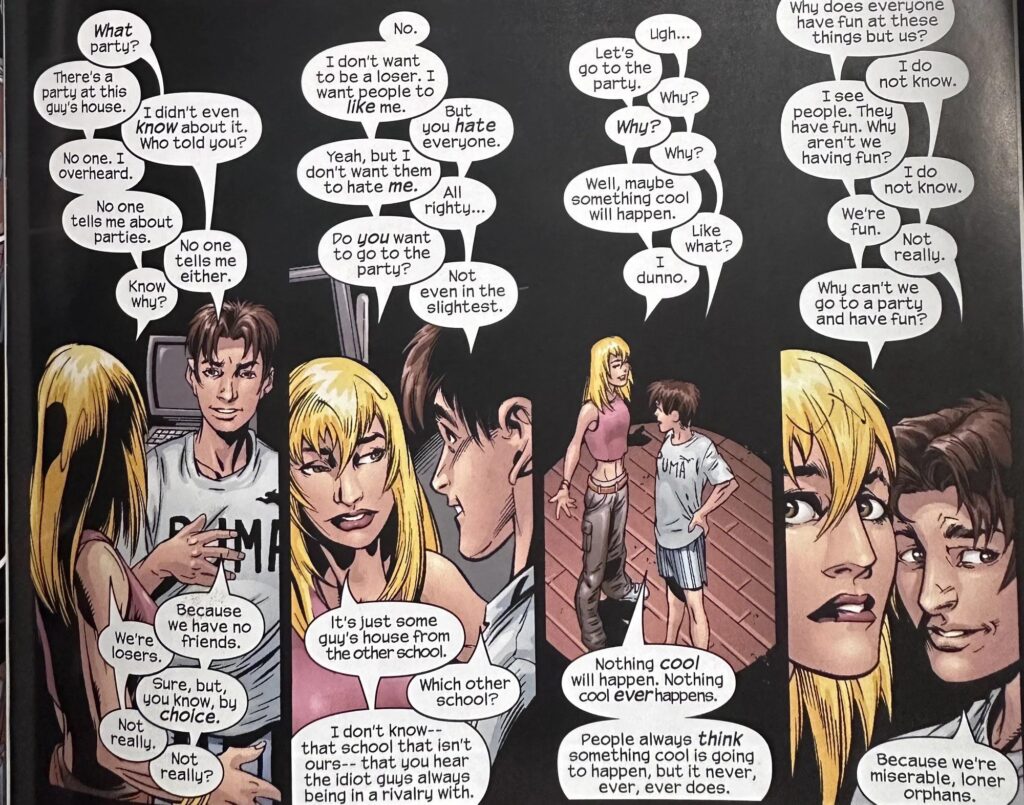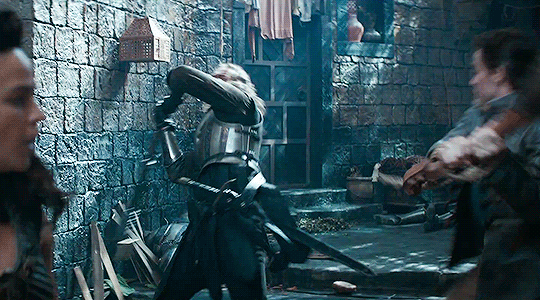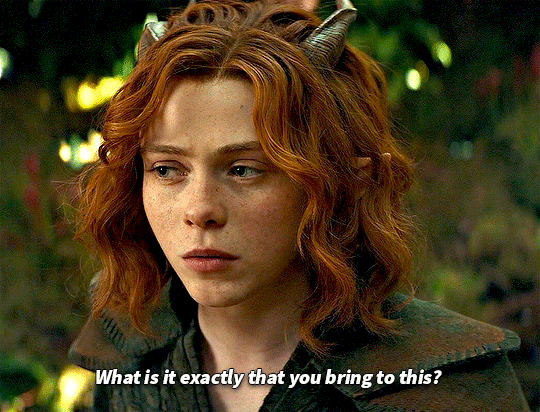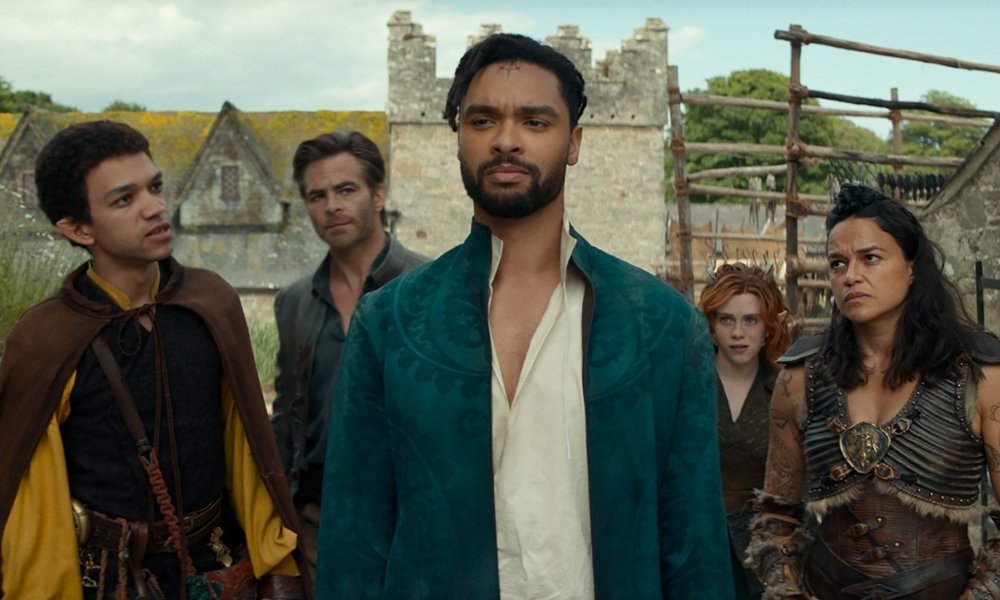I had the pleasure of finally seeing the Dungeons & Dragons movie this weekend, and something in particular inspired me to write about it. So why not bring back Movie Blog Mondays?

In case you haven’t seen it already, D&D: Honor Among Thieves is a fun movie! I won’t go into spoiler territory here, but in a general sense, it’s a story about a ragtag party that comes together for a little adventure. It’s a fantasy told through the lens of the D&D setting with references galore, but I’m not here to review the movie itself. This is about one aspect of it in particular that I really thought it got right.
Comedy in Blockbusters
When it comes to blockbusters, audiences have come to expect their movies to come lathered with hefty doses of disarming jokes and comedic moments. In order to REACH A MAXIMUM AUDIENCE™, moments with genuine discomfort or emotional weight are frequently undercut by jokes so as to keep every member of the audience entertained. Even if your story beats are awkward or the pacing is bad or the characters have no depth… they laughed, so the movie must be pretty good, right?
But let me clarify: humor in a blockbuster adventure film isn’t bad. Hell, I write a parody that’s just “Gundam Wing with jokes” at its core. And comedic relief is nothing new to cinema. But the relief part is what’s important: it’s there to give the viewer a respite. It’s meant to keep a film from becoming too dark or too emotionally demanding. It can humanize characters or shine a light on how silly this all is when you’re not immersed. It’s a spice to be added for flavor.
And like any other spice, it can be used incorrectly and ruin the meal.

While the Marvel cinematic universe was far from the first set of films to overdose on “quip” dialogue, it certainly popularized it. (Movie franchises that make a bazillion dollars tend to do that.) And the method of writing MCU characters in this way can be traced back to the comics of the 00s.

Known as “Bendis-speak”, named after the prominent comics writer Brian Michael Bendis for popularizing the method in comics, it typically involves quick back-and-forths meant to simulate the flow of conversation, often with key parts repeated for comedic effect. It was truly different when Bendis blew up in the comics scene, and something that I really enjoyed when reading Daredevil and New Avengers. It felt different than the full-paragraph word bubbles of other comics I read, and I could hear the conversation’s peaks and valleys prominently in my imagination.
The problem is that not everyone talks like that.
As Bendis wrote more and more for Marvel– and as other up and coming writers mimicked the style in other works– it became an issue of unique voice. Characters started to sound the same. Captain America, Scarlet Witch, the Punisher, Reed Richards, it didn’t matter. They all spoke in short thoughts, repeated words at one another for emphasis and jabbed with jokes that all felt like they were pulled from Peter Parker’s head.
This extended to the movies, where over time everyone on the Avengers team were making more or less the same, and frequent, jokes at or with one another. Characters with wildly different backgrounds, motivations and moralities were confined to a one-size-fits-all script, and it resulted in unearned laughs in the middle of fight scenes at its best, or character assassination at its worst.
Everyone sounded like Peter Parker. It was a problem.

D&D’s Quips Feel Authentic
To put it simply: D&D only has one Peter Parker.
Unfortunately it’s difficult to show an example of this with the movie still new and clips sparse, so I’m going to speak more vaguely about my experience watching the film rather than pointing to specific examples.

After watching the movie with friends, we all commented on the same thing: that none of the humor felt forced. It was a genuinely funny movie with a good mix of physical comedy, banter, subverted expectations and over-the-top moments. Someone brought up recent MCU movies as an example of forced humor, and that got me thinking about what actually made this movie’s approach to comedy feel different from the MCU style I described above:
It’s that no two characters’ jokes were the same.
When Simon gets a laugh, it’s because he’s a mage with no confidence punching down on himself. When Edgin gets a laugh, it’s because he’s in the middle of a likeable, unfeigned rambling. Holga has buddy-jokes with Edgin because they’ve known each other for half their lives, while Doric gets not-so-buddy jokes with Simon, who “courted” her unsuccessfully the last time they met. And Xenk… he’s his own beast. Much like the DM-played NPC, he’s just too perfect, and that’s the joke.
While tailoring jokes to the characters seems obvious to do, in practice, it feels like a forgotten art in many big movies post-Iron Man, where everyone is reading from a similar buddy cop script. At no point in D&D does Holga say something that seems more fitting for Edgin, nor does Doric say something that briefly forgets she’s a loner who doesn’t even want to be here. Every joke put into the script took into account the characters’ relationships to each other and to the world at large. And that’s important.

How It Influences Our Work

The goal of Movie Blog Mondays was initially to show examples that in retrospect influenced our style, but in this case, I just saw the movie like two days ago, so that doesn’t really apply, does it?
But I like to think that we write our jokes to our characters, because that’s what I like. Our rough drafts can sometimes have too many Peter Parkers, but we’re conscious of that as we edit it, tailoring specific phrases and word choices to the character saying it. Wufei is harsh, Quatre is wholesome, Heero is the star of his own story, etc.
But after how much I enjoyed D&D: Honor Among Thieves for its character-driven comedy writing, I’ll be keeping it in mind as we write Episode 14.

